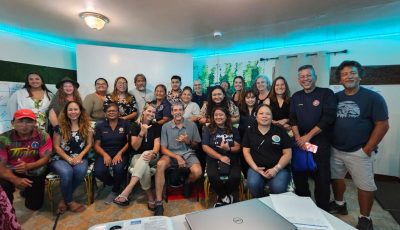Santos says new changes to CHCC policies will burden Rota patients
Sen. Teresita A. Santos (Ind-Rota) is urging Commonwealth Healthcare Corp. chief executive officer Esther L. Muña to defer the implementation of recent changes to policies that, according to the senator, will only saddle Rota patients with additional financial and emotional burdens.
Santos wrote Muña last Thursday, asking the CEO to reconsider the policies involving non-emergency intra-CNMI referral and about patient cost-sharing until such time that the CNMI can identify a steady and reliable funding source for their patients.
As of press time yesterday, Saipan Tribune was still awaiting comments from Muña.
Santos said a paragraph of the purpose section in CHCC’s non-emergency intra-CNMI referral policies states, “Intra-CNMI medical travel assistance for patients of the CHCC is designed to help patients overcome the access disparities caused by geography.” The purpose section further states that “Intra-CNMI medical travel assistance is not intended to bestow upon…Rota residents a benefit which is not available to the residents of Saipan…”
Santos said that while the stated intended goal of overcoming access disparities imposed by Rota’s geographical location is laudable, she takes issue with the second sentence of the policy, which asserts that Rota residents have somehow been enjoying a benefit otherwise unavailable to Saipan residents.
She said the second sentence contradicts the stated objective of the first sentence by ignoring the main reason why this benefit applies to Rota residents and not to the Saipan residents—overcoming access disparities imposed by geography.
Santos said everyone is aware that Rota Health Center does not have the same professional staff, medical services, medical equipment and other things, that is comparable to that of the Commonwealth Health Center on Saipan. Therefore patients from Rota must be referred to Saipan to avail of those services that are already available to Saipan residents, she said.
“Should the RHC be at par with [CHC], our patients will no longer need to travel to Saipan to seek medical care,” she said.
On the patient cost-sharing policy, Santos said it states that “the CHCC may elect to reduce or waive patient or escort cost-sharing responsibilities for referral assistance from…Rota to Saipan during a State of Public Health Emergency as declared by the governor pursuant to CNMI Law.”
The senator said that, in her view, the language of the policy to justify the reduction or waiver of patient or escort cost-sharing should be absolute rather than discretionary. Instead of saying “The CHCC may elect…,” she suggests revising the language by using the word “shall” and not “may elect to reduce or.”
She said this is not the right time to implement such provisions of the policy for these compelling reasons.
For one thing, the senator said, the COVID-19 pandemic is still wreaking economic havoc in the lives of Rota residents. “Many are still suffering from either being furloughed or have been terminated from their jobs, coupled with the eminent possibility of another reduction-in-force if our coffers do not improve in the near future,” she said.
Santos said many Rota residents are experiencing difficulty feeding their families without imposing additional medical financial burdens on them.
She said Rota’s geographic location also means that shipment of goods to Rota cost a lot more than goods on Saipan and thus the cost of living is extremely high.
The senator added that many families are still trying to recover from the devastating economic effects of the typhoons that have ravaged the islands.
Santos also noted that the local law that created a medical stipend for people receiving medical treatment on Saipan has been abruptly ceased. “This cripples the delegation’s ability to help our people seek the medical services that are not available on Rota,” Santos said.



























